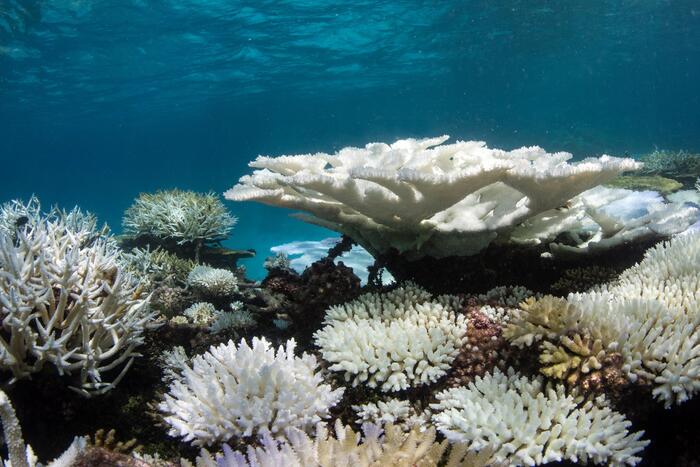Enlarge image
Floods in Lismore, Australia at the end of March this year
Photo: Dan Peled/Getty Images
"To anyone looking at Australia's response to climate change from the outside, we Aussies must seem like a nation of idiots."
Australian biologist and zoologist Tim Flannery in The New Statesman (2022)
We live in a time of paradoxes.
Things happen all the time that should actually be logically incompatible.
Australia is an extreme political example of this.
But that has changed this weekend - Scott Morrison has admitted defeat and is stepping down as party leader.
This is a win for the whole planet.
In Australia, the climate crisis is already raging in a way that the country's population can no longer ignore.
At the same time, however, people have ruled for years who did everything possible to avoid having to do anything about the climate crisis.
Almost like biblical plagues
The gigantic bush fires of 2019/2020, which devastated an area the size of Great Britain, killed 34 people and billions of animals, caused a worldwide sensation.
People who lived in big cities far from the fires also suffered from the smoky air for months.
This year many in Australia experienced heat of up to 50 degrees Celsius, followed by torrential downpours and flooding.
Humans and countless animals died again.
"First people endured months of toxic smoke, then flooding with the inevitable mold, and months without sun at the same time," said Tim Flannery, a scientist and non-fiction author quoted at the outset, summarizing the situation.
The fact that there are fires is nothing new, but the frequency and magnitude of the disasters are increasing.
This is what the climate catastrophe looks like.
It was obvious in Australia long before 2019 that it was getting hotter and hotter.
As will the fact that the Great Barrier Reef will not be able to withstand the warming and acidification of the oceans in the long term.
And despite all of that, Australia's electorate, in what was the hottest decade of the Holocene to date, once again ensured that the climate-skeptical, pro-carbon Liberals could nominate the prime minister, first climate-change denier Tony Abbott , then the very wealthy Malcolm Turnbull and, after his resignation, Scott Morrison.
The man with the lump of coal
Scott Morrison, who once brought a lump of coal into the Australian Parliament, held it up triumphantly and said "please don't be afraid of it".
Scott Morrison, who flew to Hawaii for the first time during the gigantic fires of 2019/2020.
Scott Morrison, who campaigned with fears of the economic fallout from a transition away from fossil fuels.
Always vigorously backed by Rupert Murdoch's media conglomerate, which even former prime ministers believe really determines who runs the country.
All of this is paradoxical because as early as 2020, 56 percent of Australians agreed with this statement: »Global warming is a serious and urgent problem.
We should start doing something about it now, even if it involves significant costs.” A year later, 60 percent agreed with the sentence.
To date, however, Australia has no significant plan other than vague CO₂ targets in the distant future.
All women who are fed up
Even people who might have previously voted for the Liberals were now so tired of Morrison's denial of reality that they preferred to run themselves.
Nineteen women and three men ran as “independents,” supported by an organization called Climate 200, which in turn is funded by Australian entrepreneur and billionaire son Simon Holmes à Court.
All 22 are committed to real climate politics, as well as gender equality and "integrity."
Many are career changers from the world of business or science.
It currently looks as if in a parliament with a stalemate between the Liberals and no absolute majority for the Labor Party, the Independents and the Greens could tip the scales – and thus be disproportionately influential.
It was not entirely clear on Sunday morning whether Labor would achieve its own majority.
What was clear, however, was that the Independents could win at least nine seats, many of which they took from Morrison's Liberals.
The old trick is slowly not working anymore
Australia's economy is more dependent than many other industrialized nations on exports of fossil fuels, primarily coal and gas.
Labor has also long felt a connection to the coal regions, like the SPD in Germany.
The trick of scaring people of near-term problems while simultaneously denying or ignoring the slowly looming catastrophe is now working less and less well.
The psychological phenomenon that plays a central role in this is the availability heuristic: in short, we have a tendency to believe things that we can easily remember to be more likely or frequent.
This often has politically problematic effects: For example, many people in this country massively overestimate the percentage of Muslims living in Germany.
This is a propaganda success by Thilo Sarrazin, Pegida and the AfD.
The constant ranting about the supposed threat posed by the all-powerful Islam means that many people have developed completely wrong, completely exaggerated ideas about the number of Muslims.
The estimates are on average more than 20 percent Muslims in Germany, the actual number is five to six percent.
»No skeptics at the fire hose«
In the case of the climate crisis, however, the availability heuristic plays into humanity's hands, although it belongs to the so-called cognitive distortions.
Here, for once, such a distortion is useful, because it counteracts climate change skeptical propaganda.
Advertisement
Christian Stoecker
We are the experiment
Publisher: Karl Blessing
Number of pages: 384
Publisher: Karl Blessing
Number of pages: 384
Buy for €22.00
price inquiry time
05/22/2022 1:31 p.m
No guarantee
Order from Amazon
Order from Thalia
Order from Weltbild
Product reviews are purely editorial and independent.
Via the so-called affiliate links above, we usually receive a commission from the retailer when you make a purchase.
More information here
Even if the denialists try to this day, with every extreme weather event, to put the uncertainty in the foreground again about the question of whether these were still natural fluctuations or whether it is already climate change - that no longer works.
The phrase "There are no skeptics at the end of a fire hose" has been something of a dictum among Australian firefighters for almost a decade.
But now it is no longer just the firefighters who personally experience that it is getting worse and worse.
They are large parts of the Australian population.
The causal link between CO₂ emissions, warming and extreme weather is now firmly entrenched in the majority of minds, despite coal lobbying and Murdoch propaganda.
Whether individual events can really be traced back to the warming in a scientifically reliable manner is largely irrelevant, thanks to the availability heuristic.
There is much to suggest that the climate issue has now swept Morrison out of office.
»Millions of Australians have put the climate first«, commented Amanda McKenzie from the Australian »Climate Council« on the election result.
The designated future Labor Prime Minister, Anthony Albanese, who has not yet attracted attention as a radical climate pioneer, announced after the election success that he would "make Australia a superpower of renewable energies".
If he relies on the Greens and the pro-climate Independents to govern in Parliament, he should have a much easier time delivering on that promise.
Surprise deselection or open anger
more on the subject
Severe weather in Germany: storm "Emmelinde" causes accidents and damages buildings
Research on extreme weather events:Climate crisis makes heatwaves 100 times more likely in India
As is well known, the world is again experiencing an extraordinary accumulation of extreme weather events this year, from mid-summer temperatures, heavy rain and storm events in Germany (tornadoes!) in mid-May to extreme heat and catastrophic floods in Pakistan and India.
At some point, people around the world will realize that everyone in politics and business who have been pacifying them for all these years have loaded them in the worst possible way.
The result will be further rapid political power shifts in some places - and open anger elsewhere.














